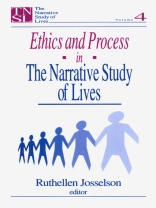In taking up the topic of ethics and narrative inquiry, The Narrative Study of Lives rightfully establishes itself as the site where the most critical theoretical, methodological, and interpretive work on narrative in the human disciplines is now occurring. The editor and the contributors to this volume are to be thanked for their deeply probing, forward-looking analyses of the ethical problems that arise when researchers produce narratives about persons with whom close personal relationships have been formed. –Norman K. Denzin, University of Illinois, Urbana-Champaign ‘All of us who work with life-history narratives are grateful to Dr. Josselson and her colleagues for moving us step-by-step toward a discipline with definable ethics and methodology, and at the same time holding up for us the incredible diversity of the field and the range of insights it offers.’ –Mary Catherine Bateson, author of Peripheral Visions The most significant truths about human beings are to be found in the stories of their lives. But what happens to those stories and to the people whose lives are told when a researcher seeks to make those stories known? Ruthellen Josselson has assembled an international cast of scholars to reflect on the process of life-narrative study and the ethical dilemmas that face researchers whose very mode of narrative inquiry may inevitably involve a violation of another and unwittingly lead to a sense of betrayal, shame, or guilt. In these disarmingly candid and engaging essays, narrative researchers of many different stripes talk about the morally delicate and epistemologically precarious enterprise of telling another′s story. The authors raise fascinating questions about who ultimately controls the tellings, what happens to stories once they are told, and why stories influence not only the people whose lives are told but also the tellers themselves, whose own professional and personal lives may even be captured by or appropriated into the stories they are aiming to tell. This exceptional volume, the latest in The Narrative Study of Lives series, is essential for researchers, professionals, and students in research methods, including qualitative methods, developmental psychology, education, relationships, and language and discourse analysis.
สารบัญ
Introduction – Ruthellen Josselson
PART ONE: NARRATIVE AND HUMAN FEELING
Some Reflections about Narrative Research and Hurt and Harm – David Bakan
Ethical Issues in Biographical Interviews and Analysis – Dan Bar-On
Expert Witness – Terri Apter
Who Controls the Psychologist′s Narrative
Personal Vulnerability and Interpretive Authority – Susan Chase
On Writing Other People′s Lives – Ruthellen Josselson
Self-Analytic Reflections of a Narrative Researcher
Narrating a Psychoanalytic Case Study – Pirkko Graves
Who Benefits from an Examined Life? Correlates of Influence Attribted to Participation in a Longitudinal Study – Gail Agronick and Ravenna Helson
PART TWO: WHAT WE THINK WE′RE DOING
Interpreting Life Stories – Richard Ochberg
Telling from Behind Her Hand – Gwyndolyn Etter-Lewis
African American Women and the Process of Documenting Concealed Lives
Ethics and Understanding through Interrelationships – Melvin Miller
I Am Thou in Dialogue
PART THREE: AFTERMATHS
The Resurrection of Rabbi Ya′acov Wazana – Yoram Bilu
The Dialectics of Life, Story, and After Life
Some Unforeseen Outcomes of Conducting Narrative Research with People of One′s Own Culture – Amia Lieblich
PART FOUR: FROM THE THRESHOLD
A Historian′s Perspective on Interviewing – Scott Webster
Snakes in the Swamp – June Price
Ethical Issues in Qualitative Research
The Role of the Anthropologist and the Kumina Queen – Emanuela Guano
Two Voices in an Ethnographic Interview
A Woman Studies War – Edna Lomsky-Feder
Stranger in a Man′s World
PART FIVE: COMMON GROUND
Making the Whole-Method and Ethics in Mainstream and Narrative Psychology – George Rosenwald
Ethics and Narrative – Guy Widdershoven












